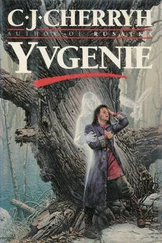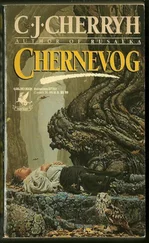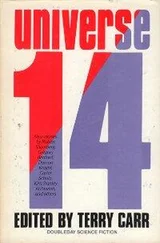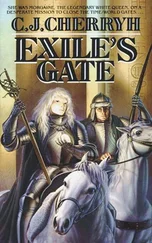C. Cherryh - Gate of Ivrel
Здесь есть возможность читать онлайн «C. Cherryh - Gate of Ivrel» весь текст электронной книги совершенно бесплатно (целиком полную версию без сокращений). В некоторых случаях можно слушать аудио, скачать через торрент в формате fb2 и присутствует краткое содержание. Жанр: romance_fantasy, на английском языке. Описание произведения, (предисловие) а так же отзывы посетителей доступны на портале библиотеки ЛибКат.
- Название:Gate of Ivrel
- Автор:
- Жанр:
- Год:неизвестен
- ISBN:нет данных
- Рейтинг книги:5 / 5. Голосов: 1
-
Избранное:Добавить в избранное
- Отзывы:
-
Ваша оценка:
- 100
- 1
- 2
- 3
- 4
- 5
Gate of Ivrel: краткое содержание, описание и аннотация
Предлагаем к чтению аннотацию, описание, краткое содержание или предисловие (зависит от того, что написал сам автор книги «Gate of Ivrel»). Если вы не нашли необходимую информацию о книге — напишите в комментариях, мы постараемся отыскать её.
Gate of Ivrel — читать онлайн бесплатно полную книгу (весь текст) целиком
Ниже представлен текст книги, разбитый по страницам. Система сохранения места последней прочитанной страницы, позволяет с удобством читать онлайн бесплатно книгу «Gate of Ivrel», без необходимости каждый раз заново искать на чём Вы остановились. Поставьте закладку, и сможете в любой момент перейти на страницу, на которой закончили чтение.
Интервал:
Закладка:
He began then to understand the terror in her, the same intense terror there was in Liell, he thought, who also wished something of him. He wished no more truth of her: it was the kind that wrought nightmares, that held no peace, that asked him to forgive things that were unthinkable.
Spare us this , he wanted to say to her. I have honored you. Do not make this impossible . He held his tongue.
“I might have killed you,” she said, “in panic. I frighten easily, you see, I am not reasonable. I have ceased to take risks at all. It is unconscionable—that I should take risks with the burden I carry. I tell myself the only immorality I have committed is in trusting you after aiming at your life. Do you see, I have no luxury left, for virtues.”
“I do not understand,” he said.
“I hope that you do not.”
“What do you want of me?”
“Hold to your oath.” She swung up to Siptah’s back, waited for him to mount, then headed them not across the vale of Irien, but around the rim of the valley, that trail which she had followed the day of the battle.
She was in a mood that hovered on the brink of madness, not reasoning clearly. He became certain of it. She feared him as if he were death itself making itself friendly and comfortable with her, feared any reason that told her otherwise.
And forebore to kill, forbore to violate honor.
There was that small, precious difference between what he served and what pursued them. He clung to that, though Morgaine’s foreboding seeped into his thoughts, that it was that which would one day kill her.
The ride around the rim was long, and they must stop several times to rest. The sun went down the other part of the sky and the clouds began to gather thickly over Ivrel’s cone, portending storm, a northern storm of the sort that sometimes whirled snow down on such valleys as this, north of Chya, but more often meant tree-cracking ice, and misery of men and beasts.
The storm hovered, sifting small amounts of sleet. The day grew dimmer. They paused for one last rest before moving onto the side of Ivrel.
And chaos burst upon them—their only warning a breath from Siptah, a shying of both their horses. Another moment and they would have been afoot. Half-lighting, Vanye sprang back to the saddle, whipped out his longsword and laid about him in the twilight at the forms that hurled at them from the woods and from the rocks, men of Hjemur, fur-clad men afoot at first, and then men on ponies. Fire laced the dark, Morgaine’s little weapon taking toll of men and horses without mercy.
They spurred through, reached the down-turning of the trail. The slope was alive with them. They clambered up on foot, dark figures in the twilight, and not all of them looked human.
Knives flashed as the horde closed with them, threatening the vulnerable legs and bellies of the horses, and they fought and spurred the horses, turning them for whatever least resistance they could find for escape. Morgaine cried out, kicked a man in the face and rode him down. Vanye drove his heels into the black’s flanks and sent the horse flying in Siptah’s wake.
There was no hope in fighting. His liyo was doing the most sensible thing, laying quirt to the laboring gray, putting the big horse to the limit, even if it drove them off their chosen way; and Vanye did the same, his heart in his throat no less for the way they rode than for the pursuit behind them—skidding down a rocky slope, threading the blind shadows along unknown trail and through a narrow defile in the rocks to reach the flat to Irien’s west.
There, weary as their horses were, they had the advantage over the Hjemurn ponies that followed them, for the horses’ long legs devoured the ground, and at last pursuit seemed failing.
Then out of the west, riders appeared ahead of them, coming from the narrow crease of hills, an arc of riders that swept to enclose them, thrusting them back.
Morgaine turned yet again, charging them at their outer edge, trying to slip that arc before it cut them off from the north, refusing to be thrust back into the ambush at Irien. Siptah could hardly run now. He faltered. They were not going to make it. And here she reined in, weapon in hand, and Vanye drew the winded black in beside her, sword drawn, to guard her left.
The riders ringed them about on all sides now, and began to close inward.
‘The horses are done,” Vanye said. “Lady, I think we shall die here.”
“I have no intention of doing so,” she said. “Stay clear of me, ilin . Do not cross in front of me or even ride even with me.”
And then he knew the spotted pony of one that was at the head of the others, ordering his riders to come inward; and near him there was the blaze-faced bay that he expected to see.
They were Morij riders, that ran the border by Alis Kaje, and sometimes harried even into this land when Hjemur’s forces or Chya’s grew restive.
He snatched at Morgaine’s arm, received at once an angry look, quick suspicion. Terror.
“They are Morij,” he pleaded with her. “My clan. Nhi. Liyo , take none of their lives. My father—he is their lord, and he is not a forgiving man, but he is honorable. Ilin’s law says my crimes cannot taint you: and whatever you have done, Morija has no bloodfeud with you. Please, lady. Do not take these men’s lives.”
She considered; but it was sense that he argued with her, and she must know it. The horses were likely to die under them if they must go on running. There would likely be more Hjemurn forces to the north even if they should break clear now. Here was refuge, if no welcome. She lowered her weapon.
“On your soul,” she hissed at him. “On your soul, if you lie to me in this.”
“That is the condition of my oath,” he said, shaken, “and you have known that as long as I have been with you. I would not betray you. On my soul, liyo .”
The weapon went back into its place. “Speak to them,” she said then. “And if you have not a dozen arrows in you—I will be willing to go with them on your word.”
He put up his sword and lifted his hands wide, prodding the exhausted black a little forward, until he was within hailing distance of the advancing riders, whose circle had never ceased to narrow.
“I am ilin ,” he cried to them, for it was no honor to kill ilin without reckoning of his lord. “I am Nhi Vanye. Nhi Paren, Paren, Lellen’s-son—you know my voice.”
“Whose service, ilin Nhi Vanye?” came back Paren’s voice, gruff and familiar and blessedly welcome.
“Nhi Paren—these hills are full of Hjemur-folk tonight, and Leth too, most likely. In Heaven’s mercy, take us into your protection and we will make our appeal at Ra-morij.”
“Then you serve some enemy of ours,” observed Nhi Paren, “or you would give us an honest name.”
“That is so,” said Vanye, “but none that threatens you now. We ask shelter, Nhi Paren, and that is the Nhi’s right to grant or refuse, not yours, so you must send to Ra-morij.”
There was a silence. Then: “Take them both,” came across the distance. The riders closed together. For a moment as they were closely surrounded, Vanye had the overwhelming fear that Morgaine might suddenly panic and bring death on both of them, the more so as Paren demanded the surrender of their weapons.
And then Paren had his first clear sight of Morgaine in the darkness, and exclaimed the beginning of an invocation to Heaven. The men about him made signs against evil.
“I do not think that it will be comfortable for you to handle my weapons, being that your religion forbids,” said Morgaine then. “Lend me a cloak and I will wrap them, so that you may know that I will not use them, but I will continue to carry them. I think that we were well out of this area. Vanye spoke the truth about Hjemur.”
Читать дальшеИнтервал:
Закладка:
Похожие книги на «Gate of Ivrel»
Представляем Вашему вниманию похожие книги на «Gate of Ivrel» списком для выбора. Мы отобрали схожую по названию и смыслу литературу в надежде предоставить читателям больше вариантов отыскать новые, интересные, ещё непрочитанные произведения.
Обсуждение, отзывы о книге «Gate of Ivrel» и просто собственные мнения читателей. Оставьте ваши комментарии, напишите, что Вы думаете о произведении, его смысле или главных героях. Укажите что конкретно понравилось, а что нет, и почему Вы так считаете.








